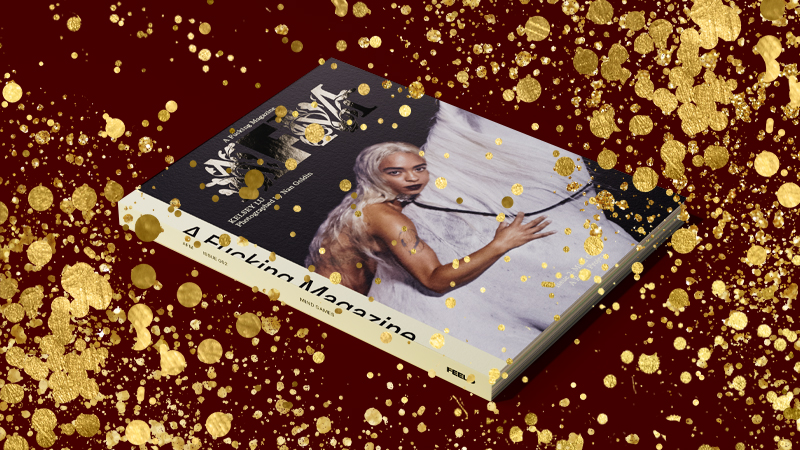
Dispatches from the dreamy launch party for a dating app’s literary magazine.
The AFM Issue 2 launch was one of those mythical parties that you hear about sometimes: No line, for starters. Free magazines and merch, free drinks, readings by talented authors. Knocking elbows with gorgeous and edgy young people from the literary scene, one of whom might just be your favorite writer. You always wonder if that kind of party will happen to you, and then it does.
AFM is short for A Fucking Magazine, a new literary venture from the sex and kink-positive dating app Feeld. While once on the tertiary edges of mainstream dating app culture, Feeld has steadily floated towards the center—or possibly the daters themselves have floated towards the edges. Whatever the case, a dating app that was once akin to a coming-out statement is now the backer of a popular, and awe-inspiringly thick, lit mag—one that is flush enough to pay for work from writers such as Garth Greenwell, Catherine Lacey, and Kesha (?), photographers such as Nan Goldin, and, as I learned, very good launch parties.
The party, which took place last week in Brooklyn, was, in short, a fantasy—in the way that Feeld itself, or any dating app, promises you a fantasy. But unlike the majority of people you meet on the internet, this one didn’t disappoint. The event took place in Public Records’s cozy sound room, with its iconic 70s conversation pit vibe. The attendees congregated near the bar, requesting intricate cocktails and skin contact wine. Small groups of friends gathered and gossiped, talking about the latest Paris Review essay they read, about their PhD-thesis-turned-nonfiction-work, about whether the couple across the bar had recently opened their relationship or were just cheating. The hosts, Haley Mlotek and Maria Dimitrova, floated around, greeting and hugging and taking photos with what seemed like everyone. There was a seated DJ—I was happy for him, he looked comfy—spinning vinyl and blasting lo-fi ambient tunes from the massive speakers.
Not many publishing soldiers here, my publishing soldier date said to me, scanning the room. Mostly it was young, buzzy novelists, and young, buzzy magazine writers, many, or all of whom, had recently had a piece or book explode on the internet, or what’s left of it. People who had, somewhere or other, and no matter their gender, been declared the “new literary it girl.”
You can’t argue with this production value, another friend said, flipping through a copy of the heavyweight, bound magazine. His girlfriend immediately started persuading him to write a piece for AFM, on the basis that the editing would be rigorous and the pay, most appealingly, would be premium.
Then the first reader got up. Jamie Hood read from “a kind of delusional girl perspective” essay about a trip with her boyfriend, Hannah Gold on a discomfiting age-gap date, and Orlando Reade read my personal favorite, a perfect and hilarious piece about finding out that his rigorously researched history of Paradise Lost and Milton, entitled What In Me is Dark, shares a name with a Harry Potter erotica fan fiction about a young Tom Riddle and a certain “Hadrian Peverell.” I can’t say more. (Just read it here.)
After the readings—which had included the words edging, squirting, coming, tongues, and pussy more times than one could keep track of—were over, I noticed that the recently impassioned girlfriend was no longer insisting her boyfriend submit. It is a fucking magazine, after all.
The DJ oozed back to his spot. The crowd pulsed again toward the bar. Good old-fashioned flirting was happening all around me, in the hazy, golden light. We finished our mezcal margaritas and stuffed the free magazines into our tote bags. We said our last hellos and last goodbyes. It’s hard to want to leave such a world, my publishing soldier said, as we stepped out of the fantasy and into the blast of cold night air, wrapping our coats around us and maneuvering gently around the buzzy novelists, who stood vaping in bare legs, immune.
Of course, there’s a natural tendency to wonder at the whole thing. What on earth is a dating app doing, creating a literary magazine, even more so such a gorgeous one? To what end? Who are these people? Where is the money coming from? How long will it last? What is their end game? To all that, I would have to say, don’t ask questions. Let’s try to appreciate what we have. Sure, it would be nice if corporations weren’t the ones funding our few remaining print literary magazines, but that is simply not the world we’re living in. And in this version: we are okay with the Feeld relationship, because, ultimately, reading good writing about dating and sex is fun, no matter that the pieces could potentially be seen as (creatively written, interesting, very good) advertising copy. Also, there were free pens.
Julia Hass
Julia Hass is the Book Marks Associate Editor at Literary Hub.



















